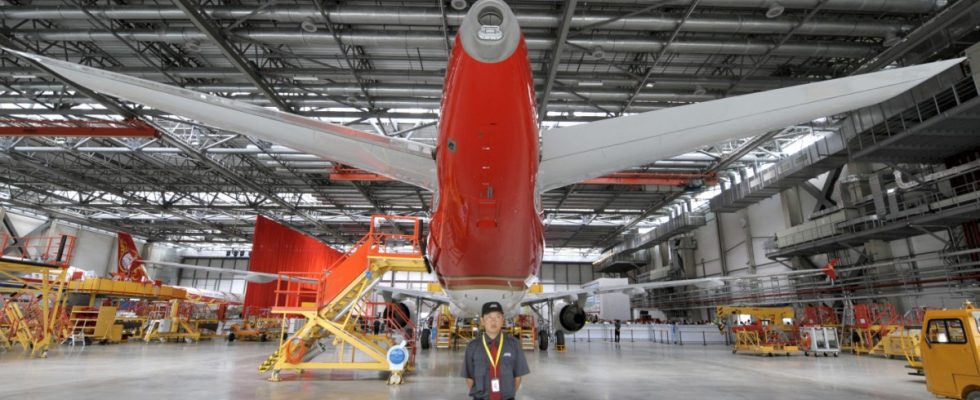When the Chinese aircraft procurement authority ordered around 300 new machines for the state airlines from Airbus last year, at first glance this did not involve any consideration, as is usual in such cases. China just seemed to be buying a bunch of new Airbus jets to accommodate the targeted growth in air traffic.
Ever since French President Emmanuel Macron showed up in Beijing with a large business delegation last week, people have learned better. The delegation also included Airbus boss Guillaume Faury, who signed a new contract with the Chinese aviation group Aviation Industry Corporation of China (AVIC) and the investment authority of the city of Tianjin in the presence of the head of state. According to the agreement, another final assembly line for short- and medium-haul A320neo series aircraft will be built at the Airbus plant in Tianjin by 2025. Up to twelve instead of the previous six machines per month are to be delivered from there in the future, primarily to Chinese airlines.
Airbus urgently needs more production capacity
However, it is a good thing for Airbus that China usually wants industrial investments in return for large orders. Because Airbus can currently use nothing better than more production capacity and if it also means gaining a strategic advantage over rival Boeing in one of the largest markets – so much the better. Concerns that China is learning too much too quickly in aircraft construction and is building up its own industry have existed since Airbus founded the factory in Tianjin in 2008, but have not prevented expansion.
Airbus plans to increase production of the A320neo series from an average of 43 per month to 75 per month by 2026, as demand for the jets is currently enormous. Actually, the goal should have been reached by 2025. But Faury and his people had reckoned without their own suppliers. These are currently not even able to supply the currently planned production, let alone higher rates. Above all, the engine manufacturers are still in chaos, there is a lack of parts in production and spare parts for repairs. Airbus hopes that things will only get better in 2024.
But the company’s own capacities must also be expanded. The plant in Mobile, USA will get a second final assembly line, which will produce the first machines in 2024, Tianjin will follow in 2025. At the main plant in Toulouse, the two old production lines will be closed and replaced by two new ones – in the A380 hangar on the other side of the airport has been there since At the end of the giant jet, there is enough space for the construction of the bestseller, for which Airbus currently has 6,000 more orders – enough for more than ten years of production. Hamburg will retain four assembly lines, remaining the largest single location for the aircraft in the series, with the larger A321neo in particular being in demand. However, based on the six additional lines, the majority of production will no longer take place in Hamburg in the future.
Which fits in with Airbus’ strategic production planning. The machines in the Mobile, Alabama plant are mainly delivered to North American airlines, those from Tianjin to Chinese ones. Airbus believes China will take delivery of every fifth Airbus aircraft in the future. However, only eight percent of the production for airlines in the country is currently planned, so further orders must follow. It is good for Airbus that Boeing cannot count on similar business. Although Chinese airlines have currently ordered more than 400 Boeing jets on paper, it is doubtful whether they will ever be delivered given the political tensions between the USA and China. And Boeing has so far been much more cautious than Airbus when it comes to industrial cooperation. That is not likely to change anytime soon.

